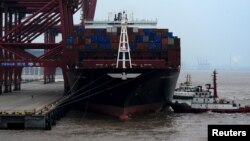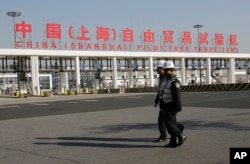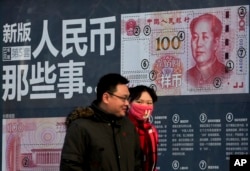The Chinese economy may face an uphill battle to achieve its government-earmarked range of 6.5-7 percent growth this year after exports and imports both performed worse-than-expected in January, analysts say.
Despite the weak trade data and a volatile trading day, Chinese shares closed with only modest losses on Monday after the central bank stepped in with a strong fix for its weakened yuan.
The country’s exports fell 11.2 percent from a year earlier in January - a seventh consecutive month of declines, while imports tumbled for the 15th straight month, 18.8 percent year-on-year, according to data released by the General Administration of Customs on Monday.
Imports down, exports lower
That means the world’s second largest economy posted a record trade surplus of $63.3 billion last month, compared to $60.09 billion in December last year – partly due to tepid demand and falling commodities prices.
“[The] exports market remained very weak, but imports were dragged by huge and continued drops of commodities prices especially oil and, of course, very weak domestic demand,” said Chris Leung, executive director and senior economist at DBS Bank, which forecast China’s economy to grow 6.5 percent in 2016.
Analysts say January’s trade performance may not be fully comparable due to front-loading effects, whereby shipments were made ahead of the schedule for fear of a possible disruption during the Chinese Lunar New Year vacation.
But, Leung added, it remains a “tough order” for China to meet it GDP target this year because eased monetary policies to prop up the export-reliant economy didn’t appear to work.
Exports continued their downward trend despite China having allowed its currency to depreciate almost 6 percent since last August in order to make exports cheaper, which indicates the extent to which the global demand has weakened.
Domestic demand
Domestic demand will then be China’s major growth engine this year, in particular, investment growth, according to Liu Ligang, greater China chief economist at ANZ Bank.
“China’s growth will continue to slow down. And we expect only 6.4 percent growth this year. Net exports will contribute very little. The government will have to use domestic demand as the driver,” Liu said.
International Monetary Fund chief economist Maury Obstfeld has previously warned that China’s slowdown, along with rising volatility in emerging markets would be two of the top global economic risks this year.
That puts Beijing under heavy pressure to step up efforts to swiftly overhaul its economy, in which growth slowed to a 25-year low of 6.9 percent in 2015.
And more monetary easing ahead is widely expected, although its effects are likely to be questioned.
“The world has been too much dependent on monetary policies for so long. What it do is [to] encourage people to bet on more risky assets. But overtime the impact on the real economy isn’t there at all,” said Leung said.
Given China failed to achieve its goal of reaping a 15 percent growth in fixed-asset investments last year, ANZ’s Liu urged Chinese authorities to encourage its bond market to further develop – a less risky destination to boost investment as investors are on the lookout for high-yield products.
Local market reaction
On the back of disappointing exports data, local bourses in China Monday opened down nearly 3 percent in the first hour trading after a full week off for the New Year holiday.
But a strong rally elsewhere in Asia and a regulator-instigated rise in the Chinese yuan lured investors to buy back shares.
Resumed trade volumes pushed up Chinese shares, which ended up with only modest losses. Both the CSI300 index of the largest listed companies in Shanghai and Shenzhen, and the Shanghai Composite Index closed down 0.6%.
Some analysts attribute the central bank’s move to strengthen the yuan as a market-stabilizing factor, which gave a shot of confidence to the local bourses.






